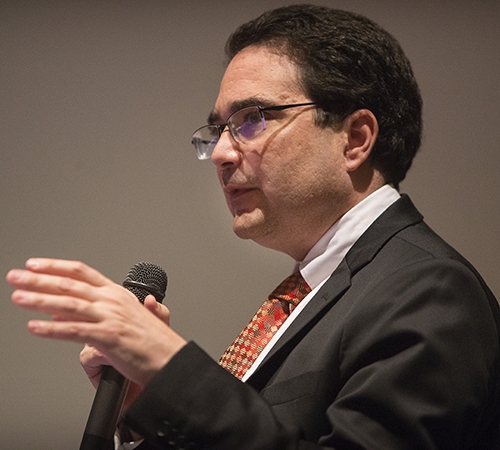Publisher's note: The author of this post, Jules Norwood, is a contributor to ECU News Services.
Guest speakers tackle topic of memorials, memory
The controversy and debate surrounding memorials and building names, and the role they play in shaping our collective memory and understanding of history, have played out in recent years locally, nationwide and even globally.
Two authorities on the subject met to discuss the topic "What's in a Name? Memorials and Historical Memory" on Tuesday in East Carolina University's Hendrix Theater. Derek Alderman, head of the Department of Geography at the University of Tennessee, and Alfred Brophy, a professor at the University of North Carolina School of Law, participated in the Brewster Forum, a debate-style presentation moderated by Gerald Prokopowicz, ECU professor of history.
The Brewster Forum is part of the Voyages of Discovery Lecture Series, now in its ninth year. The series, said William Downs, dean of ECU's Thomas Harriot College of Arts and Sciences, seeks to engage the campus and the citizens of eastern North Carolina on topics of enduring importance.
The topic for this year's Brewster Forum, Downs said in his introduction, was clearly motivated by the public debate over renaming Aycock Hall, but was also an opportunity to address important larger issues surrounding the challenge of reconciling history with contemporary realities.
"History and the politics of place are important," he said.
"We don't run away from controversy; we seize it as an opportunity to study, to learn and to teach."
More than 80 students, faculty and community members attended the event, during which each speaker gave opening remarks, followed by a discussion prompted by questions from the moderator and then questions from the audience.
Alderman, who taught at ECU from 2000-2012, said he is open to renaming — or at least discussing the renaming — of buildings that honor controversial figures.
"Names can have an impact on people," he said, but he emphasized that more important than the renaming itself is the discussion and work that surrounds it, hopefully resulting in a more thorough understanding of history.
Alfred Brophy, a professor at the University of North Carolina School of Law, was one of two experts to lead discussion on memorials and building names at the Brewster Forum on Tuesday. Brophy argued for more resistance to renaming in most cases.
Brophy argued for more resistance to renaming, though he acknowledged that in some extreme cases, renaming could be appropriate.
"I'm generally skeptical of renaming because it facilitates forgetting," he said.
"But I recognize that some monuments are too bitter a pill for some people."
"I think if we take these down, we're contributing to erasing reminders of a certain viewpoint," he added.
"It's important to remember why we have this chasm in African American or non-white wealth ... and these physical reminders drive that point home."
Brophy agreed with Alderman on the importance of discussing and contextualizing the history that led to the name or monument in the first place.
"Too often we use [renaming] to avoid actually addressing the issue," Alderman said.
"Renaming needs to be folded into a larger structural discussion of the history of racism."
Both speakers commended ECU for its approach to the controversy surrounding Aycock Hall. They agreed that the university got it right by allowing discussion and not making a rushed judgment, and by providing for contextualization of the history through the building of Heritage Hall, where the building's namesake and other people of historical significance to the university will be acknowledged.
"The proof will be in the pudding," Alderman said,
"but I consider it an innovative approach to the issue."
"Much more important than a renaming or an apology is learning about our past," he added.
"Only that way can we fulfill the mission of the university."
The two speakers also participated in a small-group session with students on campus earlier in the afternoon. Several students offered insightful and thought-provoking comments that helped shape the evening's discussion, said Alderman.
"The small group provided an opportunity to talk through some of these ideas," he explained.
"Ideas don't just happen, they don't always come out ready and polished. You have to turn them over and bounce them around."
Geography student Tristan Briggs said she attended and participated in both events because of their relevance to the national issue.
"As a human geography student, I'm focused on the racial and cultural aspects of the land and people, but you don't always realize or think about how widespread this issue is."
Alderman and Brophy, along with the students in the small group, listed a number of places and ways that the tensions over monuments and place names have come to the forefront throughout the U.S. and abroad.
Minh Phan, a geography student, described a discussion in Richmond Hill, Ga. over its designation as a Henry Ford city after Ford was criticized for anti-Semitism.
"There are strong connections to Ford in the community, and people who appreciate what he's done, but maybe we don't want him representing our views today," Phan said.
"It's a big issue nationwide," said English student Sarah McKeever.
"Particularly in this area, being from here, I'm interested in how these changes are dealt with."
In the end, Alderman and Brophy agreed, it's a complicated issue, and one for which there is no one-size-fits-all solution. First and foremost, it's important for the public to have a voice in the discussion.
"Everyone who's affected by these decisions should be involved in them," Brophy said.

Derek Alderman, head of the Department of Geography at the University of Tennessee, and Gerald Prokopowicz, ECU professor of history, listen to discussion about memorials and building names at the Brewster Forum on Tuesday.

ECU sophomore Emmett Sarkorh asks a question during the Brewster Forum, part of the Voyages of Discovery Lecture Series, on Jan. 26. Attendees explored the challenge of reconciling history with contemporary realities in the naming of memorials. (Photos by Jay Clark)

























